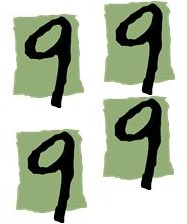
Sharon asks, “My boyfriend said I should write ‘allot’ instead of ‘a lot’ but I’m a bit confused – is this correct?”
a very important little squiggle adored by Teena Hughes
Hi Teena,
 Like the site, short and snappy, tells me what I want to know with just enough to tell me why it’s the right answer.
Like the site, short and snappy, tells me what I want to know with just enough to tell me why it’s the right answer.
One I’ve come across a couple of times recently is the use of ‘heart-rendering’ instead of ‘heart-rending’ with the meaning of invoking deep emotion. Heart-rendering would surely be something done by a butcher!
Thanks again for a great quick reference, invaluable at work.
Paul from New Zealand
Question: “Heart Rendering without cement?”

Which of the following example(s) is correct:
These questions have been bugging me for quite a long time! Thanks.

Ian asks, “Dear Aprostrophe Queen, It’s very important to me that I use apostrophes correctly, but this one has got me twisted and I hope that you can help.
I have been asked a question by email, and my immediate response was that I haven’t a clue, so I was about to shrug with the above response. Seeing it written down for possibly the first time ever sent my mind tumbling.
If I said, ‘Whose to say?’, that would be asking ‘Who has the responsibility to answer?’
If I said, ‘Who’s to say?’ that would be asking ‘Who is going to answer?’.
Which is the normally accepted question behind the phrase, or are they both worthy as a non-committal response? Thank you for any help you can give.
Kind regards, Ian”
Question: Whose to say / who’s to say?

Cade asks if it’s OK to use an apostrophe with names, and I help clarify how to go about this:
She thinks the rule only applies to words like “he,” “she.”
Can you tell me whether I’m right or wrong? I believe firmly that I am, but my friend feels just as strongly that she is.
CadeRageous”
Great question Cade!
Hey there Cade — you are correct.
It’s perfectly normal to add an apostrophe s after a person’s first name when implying “is” or “has”, so it looks like you win this challenge :-)
Some examples are:
Thanks for dropping by to read “Is it OK to use an apostrophe with a person’s name?” – let me know if you have any questions or tips by :

Looking forward to hearing from you again soon!

Teena Hughes